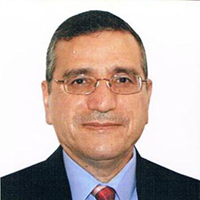Hassan hadi al-kazzaz
@alzahraa.edu.iq
AL-zahraa university for women
Al-zahraa university for women
Dr. Hassan is a distinguished family physician with extensive experience in both clinical practice and academic administration. His career began with a robust foundation in family medicine, where he demonstrated a profound commitment to patient care and community health. Rising through the ranks, Hassan's leadership skills and dedication led him to serve as a Director General, where he played a pivotal role in overseeing healthcare services and policy implementation.
In his pursuit of academic excellence, Dr. Hassan transitioned to a prominent role in education, becoming the Dean of Al-Zahraa University for Women. Under his leadership, the university has flourished, fostering an environment of academic rigor and empowerment for women in higher education. Dr. Hassan's contributions to academia were further recognized with his appointment as an Assistant Professor, reflecting his commitment to advancing knowledge and mentoring the next generation of healthcare professionals.
Throughout
EDUCATION
P.H.D FAMILY MEDICINE, MD
RESEARCH, TEACHING, or OTHER INTERESTS
Medicine, Health Policy, Family Practice, Epidemiology
FUTURE PROJECTS
In the eyes of the students, COVID19 prevention efforts at Al Zahraa University
Across sectional study was done to assess the COVID19 preventive strategies for students at Al-Zaraa University. A total of 182 undergraduate students in Health and Medical Technology college took part in this cross-sectional questionnaire-based study. Data from 182 students were collected and analyzed. Of the participant 57.7% were at the age of 19-20 yr., 152(83.5%) were residing at Karbala. 120(65.9%) of the students do not think that the university applied a preventive measure against COVID19. 95(52.2%) think that the university enforced students to wear masks inside the campus. Regarding social separation on campus, 162 (89 percent) believe it is not appropriate156 (85.7%) and 116 (63.7%) of the participants, respectively, believed that there are no preventive measures against Corona in the campus cafeteria and university transportation. During the COVID19 pandemic, Al-Zahraa university' execution of prevention and control measures was found to be weak. Effective interventions are
Applications Invited
COVID19 vaccination choice among Iraqi students at Al-Zahraa University for women
Background: COVID19 vaccine rejection is a global issue that most developing countries face. A study of COVID-19 vaccine preference among Al-Zahraa University female students will pave the way to resolving the issue of vaccine rejection among students. Vaccine hesitation refers to a delay in accepting or refusing immunization despite the fact that vaccination services are readily available. Students' preferences and refusals of the COVID19 vaccine were evaluated to determine the reasons for their decisions. Methods: This study involved 198 students from Al-Zahraa University for women. An observational cross-sectional study was conducted at Al-Zahraa University in Karbala, Iraq, to find out which Health and Medical Technology students preferred the COVID19 vaccine. Tests based on statistics made use of frequency and rate data. Results: Most students (95%) were over the age of 19. The COVID-19 vaccine was rejected by 138 people (70.4%). A total of 43 students (28.5%) believed that
Applications Invited
. HPLC-ESI/MS-MS Metabolic Profiling of White Pitaya fruit and Cytotoxic Potential Against Cervical Cancer: Comparative Studies, Synergistic effects, and Molecular Mechanistic Approaches
Natural approach became a high demand for the prevention and treatment of such diseases for their proven safety and efficacy. This study is aimed to perform comparative phytochemical analysis of white pitaya (Hylocereus undatus) peel, pulp and seed extracts via determination of total flavonoid content, phenolic content, and antioxidant capacity, coupled with HPLC-ESI/MS-MS analysis. Further, we evaluated the synergistic cytotoxic potential with Cisplatin against cervical cancer cells with investigation of underlying mechanism. The highest content of phenolics and antioxidants were found in both seed and peel extracts. The HPLC-ESI/MS-MS revealed identification of flavonoids, phenolic acids, anthocyanin glycosides, lignans, stilbenes, and coumarins. The cytotoxicity effects were evaluated by MTT assay against prostate, breast and cervical (HeLa) and Vero cell lines. The seed and peel extracts showed remarkable cytotoxic effect against all tested cell lines. Moreover, the selectivity ind
Applications Invited
Publications
COVID19 vaccination choice among Iraqi students at
Al-Zahraa University for women
RESEARCH OUTPUTS (PATENTS, SOFTWARE, PUBLICATIONS, PRODUCTS)
PUBLIC EDUCATION
SOCIAL, ECONOMIC, or ACADEMIC BENEFITS
Improve community health

